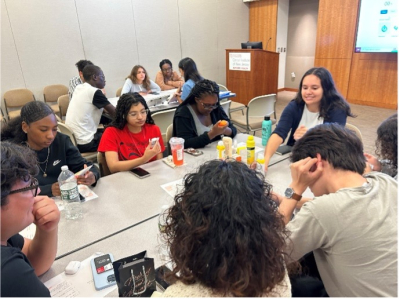View all program meetings and events at the Cancer Institute.
SEMINARS
The Distinguished Lecture Series (webcast)
This monthly seminar series invites prominent scientists from around the country to visit Rutgers Cancer Institute. The series has featured Nobel laureates, members of the National Academy of Sciences, and other preeminent researchers. Each lecture attracts more than 100 attendees from multiple research programs across the consortium. Speakers are proposed by faculty and program leaders and invited by the Director of the Cancer Institute. Trainees have an opportunity to have lunch with speakers during their visit.
Department of Radiation Oncology Grand Rounds (webcast)
This series occurs the first Friday of every month September through June and is focused on issues of specific interest to the radiation oncology community. Speakers are chosen and invited by program leaders and faculty to assure integration with the program.
Download the 2025-2026 schedule →
The Predoc/Postdoc Seminar Series
This series meets weekly. Faculty throughout Rutgers Cancer Institute present an overview of their work followed by "work-in-progress" presentations by predoctoral and postdoctoral trainees. (All trainees at Rutgers Cancer Institute are required to present their work annually). Outside speakers are also invited to present during this series.
Grant Writing Seminars
The university sponsors full-day as well as multi-session grant writing programs provided by highly-rated external consulting firms. For example, over the last two years, Rutgers Biomedical and Health Sciences (RBHS) sponsored a full-day Grant Writers Workshop titled "Write Winning Grant Proposals," which was attended by newly-recruited faculty from the Rutgers Cancer Institute. Several additional trainings for PhD students, postdoctoral fellows, and early/mid-career faculty are available through the New Jersey Alliance for Clinical and Translational Science.
Translational Research in Cancer
This seminar meets twice monthly and includes a short didactic section given by a relevant member of the training faculty followed by discussion of papers and "work in progress" by the trainees. Each trainee and their mentor present an overview and discussion of results once per year. The remaining sessions follow the form of a disease-based course focusing on basic, clinical, and translational issues in particular malignancies, providing an overview of disease characteristics. Subjects and papers are chosen to give a comprehensive understanding of the etiology, biology, and therapy of the various malignancies. An additional advantage of this approach is that ongoing research and literature papers are discussed, providing examples of studies encompassing both laboratory and clinical aspects of translation. This exposes trainees to "cutting edge" translational approaches to the prevention, diagnosis, and treatment of cancer.

COURSES
Clinical Research Design
Taught by faculty at Rutgers Cancer Institute, the goals of this 13-lecture introductory course are to:
- Provide a basic understanding of concepts, research methodologies, biostatistical tools, and ethical and regulatory procedures in patient-oriented research
- Train scholars to interpret the results of clinical investigations
- Utilize the knowledge gained for research and patient care
Topics covered in the course include:
- Hypothesis-based research
- Clinical research design
- Epidemiology
- Clinical trials
- Statistical methods
- Ethical issues in clinical investigation
This course is offered to postgraduate trainees at the Rutgers Cancer Institute, postdoctoral fellows in our research training programs, and junior faculty. Participants also include Rutgers Robert Wood Johnson Medical School faculty as part of their formal mentoring program.
Topics in Molecular Medicine (Rutgers Course 16:681:681)
This is a graduate-level course taught by Cancer Institute faculty members during the fall semester of each year. The sessions follow a journal club format. The students discuss a research paper which is selected by the faculty member moderating that session. The objectives of this course are to: 1) introduce students to molecular approaches used to prevent, diagnose or treat cancer; 2) develop skills to critically review cancer research literature; and 3) develop effective scientific communication skills.
Byrne Seminar: Eliminating Cancer: Novel Targets and Therapeutic Approaches (Rutgers Course 01:090:101:12)
 This seminar series is held in the fall semester of each year. Incoming freshman undergraduate students at Rutgers are introduced to the novel approaches being used for target identification and treatment at the Cancer Institute and how these are being translated into cutting edge treatments for cancer patients. The seminar has ten sessions of eighty minutes each. Dr. Sunita Chaudhary (Director, Research Education) provides a basic introduction to the biology of cancer, followed by talks from Cancer Institute faculty speakers on tools for identifying novel targets, diagnosis, and prognosis in disease specific areas (melanoma, breast cancer, pancreatic cancer, prostate cancer, and hematological malignancies). The first half of each disease specific session is led by a basic researcher and focuses on the biology, while the second half is led by a clinician and focuses on the targets and therapy.
This seminar series is held in the fall semester of each year. Incoming freshman undergraduate students at Rutgers are introduced to the novel approaches being used for target identification and treatment at the Cancer Institute and how these are being translated into cutting edge treatments for cancer patients. The seminar has ten sessions of eighty minutes each. Dr. Sunita Chaudhary (Director, Research Education) provides a basic introduction to the biology of cancer, followed by talks from Cancer Institute faculty speakers on tools for identifying novel targets, diagnosis, and prognosis in disease specific areas (melanoma, breast cancer, pancreatic cancer, prostate cancer, and hematological malignancies). The first half of each disease specific session is led by a basic researcher and focuses on the biology, while the second half is led by a clinician and focuses on the targets and therapy.

